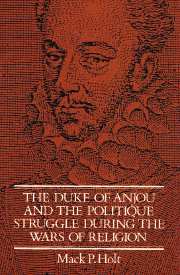Book contents
- Frontmatter
- Contents
- List of maps
- Preface
- Abbreviations
- Introduction
- 1 Prologue: civil war and the early years of François de Valois, 1555–72
- 2 From St Bartholomew's Day to the death of Charles IX, August 1572–May 1574
- 3 War and peace, May 1574–May 1576
- 4 The Estates-General and the renewal of civil war, May 1576–September 1577
- 5 Overtures from the Netherlands, September 1577–January 1579
- 6 Civil war, marriage, and more overtures from the Netherlands, January 1579–December 1580
- 7 Ménage à trois: Elizabeth, Anjou, and the Dutch Revolt, January 1581–February 1582
- 8 Turmoil in the Netherlands, February 1582–January 1583
- 9 ‘The ruin of France’, January 1583–June 1584
- Appendices
- Select bibliography
- Index
2 - From St Bartholomew's Day to the death of Charles IX, August 1572–May 1574
Published online by Cambridge University Press: 15 December 2009
- Frontmatter
- Contents
- List of maps
- Preface
- Abbreviations
- Introduction
- 1 Prologue: civil war and the early years of François de Valois, 1555–72
- 2 From St Bartholomew's Day to the death of Charles IX, August 1572–May 1574
- 3 War and peace, May 1574–May 1576
- 4 The Estates-General and the renewal of civil war, May 1576–September 1577
- 5 Overtures from the Netherlands, September 1577–January 1579
- 6 Civil war, marriage, and more overtures from the Netherlands, January 1579–December 1580
- 7 Ménage à trois: Elizabeth, Anjou, and the Dutch Revolt, January 1581–February 1582
- 8 Turmoil in the Netherlands, February 1582–January 1583
- 9 ‘The ruin of France’, January 1583–June 1584
- Appendices
- Select bibliography
- Index
Summary
The young duke of Alençon was forced into a more prominent role in the French Wars of Religion in 1572 because of the international rivalry in Western Europe and the religious tension that had built up within France itself. Moreover, both issues fused together in that year and exploded in the most violent series of killings and bloodshed of the entire civil wars: the massacres that began in Paris on 24 August. These massacres were the result of an unsuccessful attempt to assassinate the admiral of France, Gaspard de Coligny, whose efforts to lead a Huguenot army to aid the Dutch rebels in the Netherlands threatened war with Spain. Less directly, the massacres were caused by the serious division between Protestants and Catholics that had precipitated the civil wars a decade before. The French reformed church had certainly grown since the failure of the Conspiracy of Amboise, and this despite the efforts of the theologians of the Sorbonne and the Catholic nobility clustered around the Guises. But in spite of the patronage of many noble families, most notably the Bourbons, in 1572 the Huguenots were still seeking to establish their legal right to worship outside the limited areas that were outlined in the treaty of St-Germain in 1570. In January 1570 Jeanne d'Albret, the widow of Antoine de Navarre, had sought in vain for the maintenance of the reformed religion in all of France, as well as ‘the king's protection without exception for all sermons, baptisms, communions, marriages, and all other acts and exercises'.
- Type
- Chapter
- Information
- Publisher: Cambridge University PressPrint publication year: 1986



